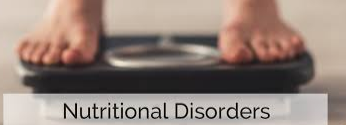Nutritional Disorders MCQs :-
1. What are the recommended daily adult requirements for Vitamin B3 (niacin)?
- 4-8mg
- 36-40mg
- 14-16mg
- 22-26mg
2. What are the recommended daily adult requirements for Vitamin B2 (riboflavin)?
- 1.3mg
- 3.6mg
- 0.5 mg
- 4.8 mg
3. Which of the following foods are a rich source of folic acid?
- Red beans
- Potatoes
- Beef liver
- Oranges
- Wheat germ
4. Brittle nails, constipation, respiratory problems, tongue soreness or inflammation, anemia, pallor, weakness, cold sensitivity and fatigue are symptoms of a deficiency of:
- Manganese
- Zinc
- Iron
- Iodine
- Selenium
5. Severe neuromuscular disturbances are likely toxicity signs of too much:
- Zinc
- Selenium
- Iodine
- Manganese
- Iron
6. Disturbances in acid-base balance is a symptom of a deficiency of:
Magnesium
Calcium
Chloride
Phosphorus
Potassium
7. Appetite loss, intestinal gas. muscular atrophy, vomiting and weight loss are symptoms of a deficiency of:
Potassium
Sodium
Chloride
Phosphorus
Magnesium
8. Diarrhea, macrocytic anemia, confusion, depression and fatigue are symptoms of a deficiency of:
Ascorbic acid
Biotin
Retinol
Pantothenic acid
Folate
9. General failure of all body systems may result from a deficiency of:
Ascorbic acid
Pantothenic acid
Retinol
Folate
10. Confusion, disorientation, nervousness, irritability, rapid pulse, tremors, muscle control loss and neuromuscular dysfunction are symptoms of a deficiency of:
Phosphorus
Potassium
Chloride
Magnesium
Calcium

11. What are the recommended daily adult requirements for phosphorus?
100 mg
700 mg
250 mg
500 mg
12. Vomiting and diarrhea are likely toxicity signs of too much:
Selenium
Cobalt
Chromium
Copper
13. Renal calculi, kidney damage. muscle and bone weakness, excessive bleeding. headaches and excessive thirst are likely toxicity signs of too much:
Vitamin C (ascorbic acid)
Vitamin A (retinol)
Vitamin K (menadion)
Vitamin E (tocopherol)
Vitamin D (calciferol)
14. Cold hands and feet. dry hair, irritability. nervousness. obesity, and simple goiter are symptoms of a deficiency of:
Iodine
Cobalt
Iron
Copper
Chromium
15. Which of the following vegetables are a good source of potassium?
Peas
Tomatoes
Carrots
Corn
Beans
16. What are the recommended daily adult requirements for potassium?
1.000mg
2.000 mg
100 mg
5.000 mg
17. What are the recommended daily adult male requirements for Vitamin K (menadione)?
400 mcg
80 mcg
200 mcg
100 mcg
18. Mottling and pitting of permanent teeth, increased bone density, and calcification are likely toxicity signs of too much:
Iodine
Molybdenum
Cobalt
Fluoride
Selenium
20. Anorexia, fatigue, depression, dry skin and heart abnormalities are symptoms of a deficiency of:
Biotin
Ascorbic acid
Retinol
Folate
Pantothenic acid
22. What are the recommended daily adult requirements for Vitamin B6 (pyridoxine)?
23 – 27 mg
1 3 – 1 7 mg
3.3 – 3.7 mg
7.3 – 77 mg
23. What are the recommended daily adult requirements (age over 70 years) for Vitamin D (calcite rol)?
25 mcg
5mcg
10 mcg
l5mcg
24. what are the recommended daily adult male requirements for zinc?
16mg
35mg
5mg
11mg
25. What are the recommended daily adult requirements for sodium?
900 mg
500 mg
250 mg
100 mg
26. Headache, dizziness, heartburn, weakness, nausea, vomiting and diarrhea are likely toxicity signs of too much:
Zinc
Selenium
Iodine
Iron
Molybdenum
27. Indigestion, diarrhea or constipation. weight loss. macrocytic anemia, fatigue. poor memory. irritability. parenthesis of hands and feet are symptoms of a deficiency of:
Vitamin B3 (niacin)
Vitamin B12 (cobalamin)
Vitamin B2 (riboflavin)
Vitamin Bi (thiamine)
Vitamin B6 (pyridoxine)
28. What are the recommended daily adult (age 51 to 70 years) requirements for Vitamin D (calc if. rol)?
5 mcg
l5mcg
25 mcg
10 mcg
29. Flushing, gastric ulcers, low blood pressure, nausea, vomiting, diarrhea and liver damage are likely toxicity signs of too much:
Vitamin B2 (riboflavin)
Vitamin 612 (cobalamin)
Vitamin B3 (niacin)
Vitamin 81 (thiamine)
Vitamin 86 (pyridoxine)